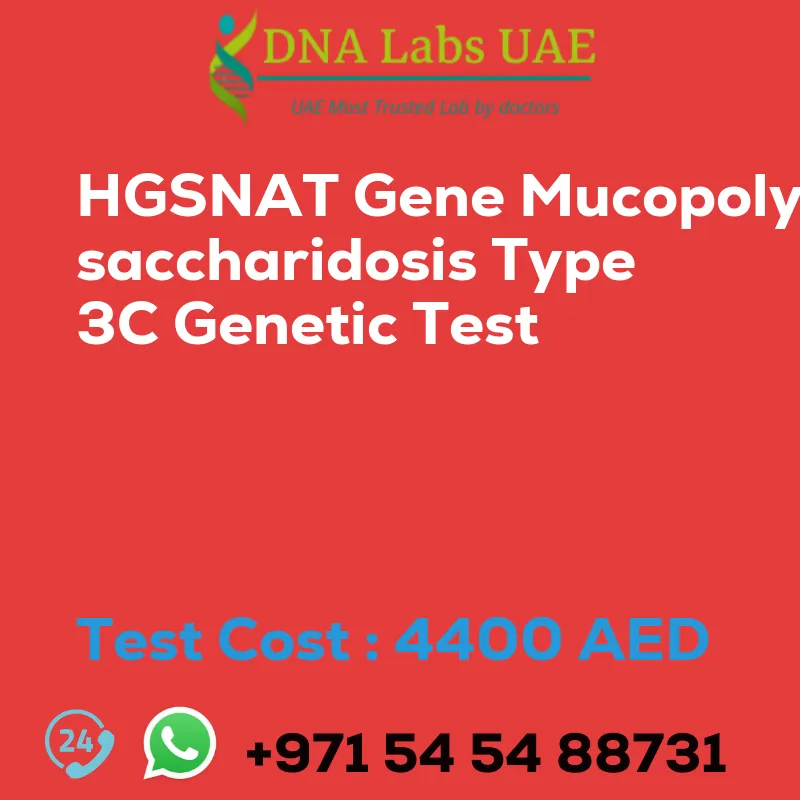HGSNAT Gene Mucopolysaccharidosis type 3C Genetic Test
Test Name: HGSNAT Gene Mucopolysaccharidosis type 3C Genetic Test
Components: Blood or Extracted DNA or One drop Blood on FTA Card
Price: 4400.0 AED
Sample Condition: Blood or Extracted DNA or One drop Blood on FTA Card
Report Delivery: 3 to 4 Weeks
Method: NGS Technology
Test Type: Metabolic Disorders
Doctor: General Physician
Test Department: Genetics
Pre Test Information: Clinical History of Patient who is going for HGSNAT Gene Mucopolysaccharidosis type 3C NGS Genetic DNA Test. A Genetic Counselling session to draw a pedigree chart of family members affected with Mucopolysaccharidosis type 3C.
Test Details: The HGSNAT gene is responsible for encoding an enzyme called N-acetylglucosamine-6-sulfatase. Mutations in this gene can lead to a condition known as Mucopolysaccharidosis type 3C (MPS 3C), also called Sanfilippo syndrome type C. MPS 3C is a rare genetic disorder that belongs to a group of conditions called mucopolysaccharidoses. These disorders are characterized by the accumulation of complex sugar molecules called mucopolysaccharides in various tissues and organs of the body.
NGS (Next-Generation Sequencing) is a high-throughput genetic testing method that allows for the simultaneous analysis of multiple genes. In the case of MPS 3C, NGS genetic testing can be used to identify mutations in the HGSNAT gene. This can help in the diagnosis of the condition and provide information about the specific genetic changes present in an individual.
NGS genetic testing for MPS 3C can be performed using a blood or saliva sample. The sample is analyzed in a laboratory, where the DNA is extracted and sequenced. The sequencing data is then compared to a reference genome to identify any variations or mutations in the HGSNAT gene.
The results of the NGS genetic test can help healthcare professionals confirm a diagnosis of MPS 3C and provide information about the specific mutations present in an individual. This information can be used for genetic counseling, family planning, and potentially for the development of targeted therapies in the future.
| Test Name | HGSNAT Gene Mucopolysaccharidosis type 3C Genetic Test |
|---|---|
| Components | |
| Price | 4400.0 AED |
| Sample Condition | Blood or Extracted DNA or One drop Blood on FTA Card |
| Report Delivery | 3 to 4 Weeks |
| Method | NGS Technology |
| Test type | Metabolic Disorders |
| Doctor | General Physician |
| Test Department: | Genetics |
| Pre Test Information | Clinical History of Patient who is going for HGSNAT Gene Mucopolysaccharidosis type 3C NGS Genetic DNA Test A Genetic Counselling session to draw a pedigree chart of family members affected with Mucopolysaccharidosis type 3C |
| Test Details |
The HGSNAT gene is responsible for encoding an enzyme called N-acetylglucosamine-6-sulfatase. Mutations in this gene can lead to a condition known as Mucopolysaccharidosis type 3C (MPS 3C), also called Sanfilippo syndrome type C. MPS 3C is a rare genetic disorder that belongs to a group of conditions called mucopolysaccharidoses. These disorders are characterized by the accumulation of complex sugar molecules called mucopolysaccharides in various tissues and organs of the body. NGS (Next-Generation Sequencing) is a high-throughput genetic testing method that allows for the simultaneous analysis of multiple genes. In the case of MPS 3C, NGS genetic testing can be used to identify mutations in the HGSNAT gene. This can help in the diagnosis of the condition and provide information about the specific genetic changes present in an individual. NGS genetic testing for MPS 3C can be performed using a blood or saliva sample. The sample is analyzed in a laboratory, where the DNA is extracted and sequenced. The sequencing data is then compared to a reference genome to identify any variations or mutations in the HGSNAT gene. The results of the NGS genetic test can help healthcare professionals confirm a diagnosis of MPS 3C and provide information about the specific mutations present in an individual. This information can be used for genetic counseling, family planning, and potentially for the development of targeted therapies in the future. |








